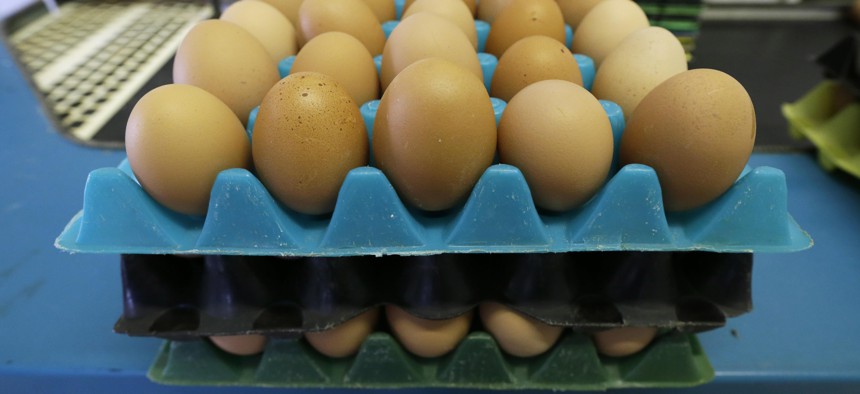Supreme Court Rejects Challenges Over State Farm Animal Laws

Eggs laid by cage-free chickens sit in a holder after being sorted by Francis Blake on his organic farm, Wednesday, Oct. 21, 2015, near Waukon, Iowa. AP Photo/Charlie Neibergall
California and Massachusetts standards for the confinement of livestock have drawn opposition from other states.
Two groups of state attorneys general were blocked Monday from bringing a challenge in the U.S. Supreme Court against California and Massachusetts laws that set standards for the treatment of farm animals raised to produce eggs and some meats sold in those states.
The attorneys general were asking the Supreme Court to allow their lawsuits to proceed directly to high court, without going through lower federal courts first.
Indiana Attorney General Curtis Hill led a dozen other state officials at odds with the Massachusetts law. Most of the plaintiffs in that case were also involved in one that Missouri Attorney General Joshua Hawley spearheaded centering on similar California laws.
On Monday, the Supreme Court justices rejected their motions to file bills of complaint with the court, stopping the cases from moving forward. Justice Clarence Thomas indicated he would have granted the motions, according to court orders.
The Supreme Court can exercise “original jurisdiction” in legal disputes between states but has in the past opted to do so sparingly.
Massachusetts voters passed the law in question there more than two years ago.
Its intended purpose is to “prevent animal cruelty” by phasing out “extreme methods” of farm animal confinement, which could also pose consumer health threats or weigh on the state’s finances.
As written, the law will apply to the sale of shell eggs, veal and pork. It will prohibit the sale of these goods in the state if they come from animals that were confined in ways that kept them from lying down, standing up, fully extending their limbs, or turning around freely.
There are some exclusions for foods like pizzas, soups and sandwiches that include veal or pork products.
The law is set to go fully into effect on Jan. 1, 2022.
California’s laws set similar standards for hens that produce eggs sold in the state. They took effect in 2015 and have withstood challenges in lower federal courts, including one brought in 2014 by Missouri that other states involved in Supreme Court action later joined.
The attorneys general behind the current cases suggest the California and Massachusetts laws run afoul of federal law and are in violation of the U.S. Constitution’s Commerce Clause, which prohibits state laws that discriminate against, or significantly impede interstate commerce.
A brief filed by Hawley’s office says “California is disregarding federal law by imposing novel standards on agricultural production in other States, inflating prices for consumers nationwide,” and it argues the state’s egg laws are violating the federal Egg Products Inspection Act.
One of Hill’s filings contends that, in Massachusetts, “The Animal Law nominally targets in-state retail sales, but in effect regulates animal housing in other States.”
“If the Court does not intervene,” another brief from Hill's office adds, the law “will require compliance by livestock farmers across the country on pain of losing access to the Massachusetts market.”
The other attorneys general seeking to challenge the California statute were from Alabama, Arkansas, Indiana, Iowa, Louisiana, Nebraska, Nevada, North Dakota, Oklahoma, Texas, Utah and Wisconsin.
Those involved in the effort against the Massachusetts law were from mostly the same states. But South Carolina and West Virginia’s attorneys general also took part and Nevada and Iowa’s attorneys general did not. Except for Iowa’s Tom Miller, who is a Democrat, the rest of the attorneys general pursuing the cases were Republicans.
Massachusetts and California in their briefs cast doubt on the standing the states had to bring the cases against their laws, posited that the dispute did not warrant the Supreme Court exercising original jurisdiction, and argued the Commerce Clause claims lacked merit.
Similarly, the Trump Administration urged the Supreme Court to deny the motions by the states to proceed with the cases.
“This case does not present the rare circumstance in which the Court would exercise its original jurisdiction to resolve a Commerce Clause question,” said a brief U.S. Solicitor General Noel Francisco’s office filed for the U.S. government in the Massachusetts case.
A filing from the solicitor general in the California dispute mirrored that position. It also took the stance that the California laws are not preempted by the Egg Products Inspection Act, despite the claims to the contrary made by the states seeking to fight the laws.
And “in order to resolve plaintiffs’ Commerce Clause challenge, both on standing and the merits,” the brief from the solicitor general’s office in the California case adds, “it would be necessary to resolve complex factual disputes that are better suited to a district court.”
Bill Lucia is a Senior Reporter for Government Executive's Route Fifty and is based in Washington, D.C.
NEXT STORY: As Shutdown Talks Stall, Democrats Try a New Tactic to Open Some Agencies






